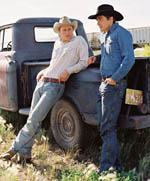 It was the buzz about Oscar-worthy performances by Heath Ledger and Jake Gyllenhaal and a likely Best Picture nomination that got me in the door to see Brokeback Mountain, latest film by Ang Lee (“Crouching Tiger, Hidden Dragon“). Based on a short story by Annie Proulx, I was curious to see how these two young Hollywood heartthrobs would pull off a gay romance between two cowboys in the wilderness of Wyoming.
It was the buzz about Oscar-worthy performances by Heath Ledger and Jake Gyllenhaal and a likely Best Picture nomination that got me in the door to see Brokeback Mountain, latest film by Ang Lee (“Crouching Tiger, Hidden Dragon“). Based on a short story by Annie Proulx, I was curious to see how these two young Hollywood heartthrobs would pull off a gay romance between two cowboys in the wilderness of Wyoming.
I had also heard the film was beyond sad, an experience I try to avoid at the movies. But this one sounded too good to miss. And it is.
Everything about this story is spare, reserved, understated: the characters of Jack Twist (Gyllenhaal) and Ennis Delmar (Ledger), their dialogue, the window we have into the state of their marriages and lives as parents. Everything, that is, except for the love they have for each other. As Jack and Ennis first meet and work together herding sheep on Brokeback Mountain and later return to life as married men trying to make a living and support their families, I found myself watching as if from a safe emotional distance. It is only when the love between them passionately emerges onto the screen, punctuating the mendacity that begins to haunt their ordinary lives, that I found myself riveted by what is a heart-rending and timeless love story. That it’s a gay love story will no doubt leave some viewers upset, but it is a story that desperately needs telling nonetheless–and needs its viewers to grasp the tragedy that these men face because of the simple fact that they are two men in love with each other.
The love affair between Ennis and Jack–tender in some moments, rough in others–is patently forbidden in their world. They are two cowboys living and working in a time and place where love between men is considered inexcusable and virtually unthinkable (and also, not so incidentally, in the same state as the real-life tragedy of Matthew Shepard’s brutal murder in more recent times). Adding to the drama, and the heartbreak, is the fact that both men embark on marriages they are destined to betray–their way of maintaining some semblance of what the status quo considers a “normal life.”
Shortly before their love affair begins, the “stain” that is brought upon Jack and Ennis is foreshadowed by Ennis’s comment that he is too inexperienced in life to have sinned yet. That’s followed up by a scene, which takes place after their first night together, in which Ennis discovers the graphic (and symbolic) remains of the first lamb to die on their watch on the mountain. The forbidden nature of their love, so obvious at first glance, grows increasingly senseless and tragic over the course of the story. Their love affair lasts 20 years, and they can only maintain it through two annual trips, precious and secluded–trips that get more painful and filled with yearning with each passing year.
I will stop there with storyline, and end by saying that “Brokeback Mountain,” despite the betrayal of marriage that runs throughout, is a difficult film to leave without a sense of forgiveness for these two men who are at once lovers and adulterers. I also can’t imagine watching the “Brokeback Mountain” credits roll without feeling a sense of hope that someday our society will stop legislating about who is allowed to fall in love–and that there will come a time when we stop pretending to know that God’s will is for love to happen only between a man and a woman.

